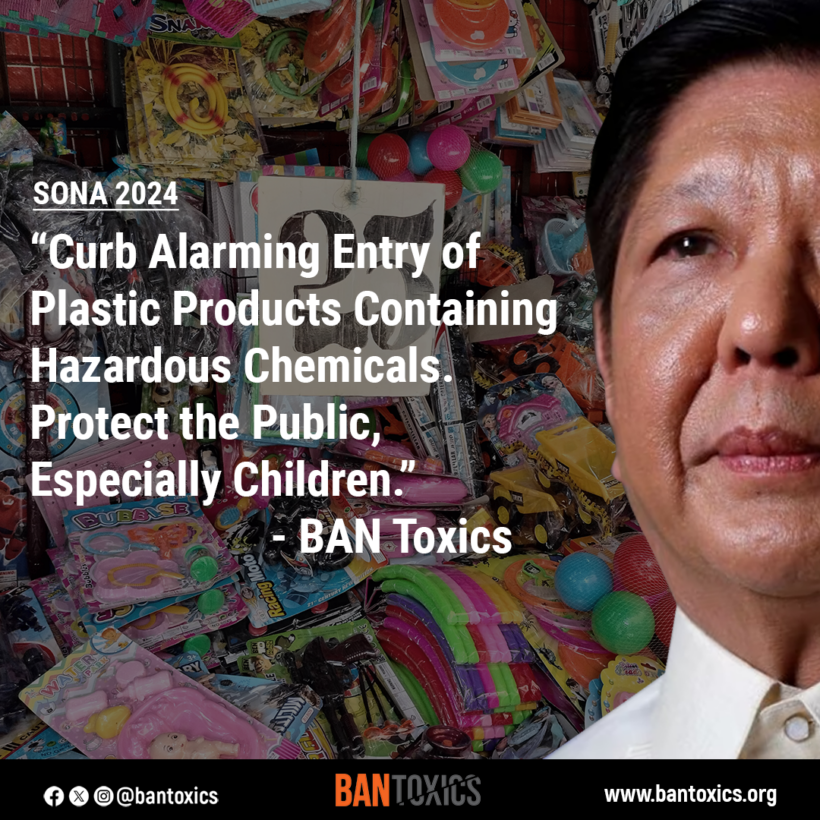Ahead of President Ferdinand Marcos Jr.’s 3rd State of the Nation Address (SONA), BAN Toxics is urging the government to address the emerging issue of harmful chemicals in plastics promptly. The toxic watchdog highlights the heightened risk of exposure, particularly for women and children, which necessitates immediate and effective action to protect human health and the environment.
“We call on the Marcos Jr.’s administration to prioritize actions to curb the alarming entry and proliferation of plastic products made of chemicals of concern across a wide range of sectors and product value chains, including toys and other children's products,” said Rey San Juan Jr., BAN Toxics’ Executive Director.
According to the State of the Science on Plastic Chemicals Report released this year, more than 16,000 chemicals are potentially used or present in plastic materials and products with a mere 6% currently subject to international regulations. More than 4,200 plastic chemicals are considered “chemicals of concern” because they are persistent (long-term presence), bioaccumulative (stay and accumulate in humans and wildlife), mobile (they spread in water systems) and/or toxic (cause harm to living organisms).
Phthalates, bisphenol A (BPA), and vinyl chloride used in plastic production are a few examples of these chemicals, which have been linked to a wide range of adverse human health effects, including cancer, reproductive harm, asthma, birth defects, neurotoxicity, and early mortality.
The group previously raised serious concerns after discovering toxic chlorinated paraffins in toys during a 2023 study conducted in ten countries, including the Philippines. “The levels of toxic chemicals in the toys were comparable to those found in hazardous wastes, such as incinerator ash.”
The study by the International Pollutants Elimination Network (IPEN) found short-chain chlorinated paraffins (SCCPs), which are banned under the Stockholm Convention on Persistent Organic Pollutants, and medium-chain chlorinated paraffins (MCCPs), which are currently under evaluation in the same Convention, in laboratory-tested plastic toys. These toxic chemicals leach into dust and are inhaled, orally transferred, or come into contact with skin, exposing children to elevated toxic concentrations.
“While the government recognizes the urgency of plastic pollution, it must equally address plastic chemicals as an essential part of this global action. It must task regulatory agencies to regulate all chemicals of concern in plastics, starting with rapid identification and management of known hazardous chemicals,” he added.
“We call for concrete actions to ban the most toxic, unnecessary, and problematic use of plastics. Equally important is for the Philippine government to require transparency of chemical information in materials and products, including the establishment of information requirements and disclosure and clear labeling of plastic chemicals of concern across value chains. Other forms and uses of fossil-based plastic must be reduced and minimized and transition to safe and sustainable alternatives.”
The group also cites an urgent issue of the presence of lead in children’s products needing priority intervention. “Our recent market monitoring and testing of children’s products have revealed alarming levels of lead, a toxic chemical hazardous to children even at low exposure levels. We urge the President to certify as urgent a law for safe and non-hazardous children’s products. This law will mandate transparency and traceability in the use of chemicals, enforce product labeling, and establish safety standards to protect children from the adverse health effects of toxic exposure.”
BAN Toxics urges Congress in both chambers to prioritize the six-year old “Safe and Non-Hazardous Children’s Products Act” bill, which seeks to regulate the importation, manufacture, distribution, and sale of children’s products containing hazardous chemicals. It also calls for appropriate institutional arrangements, such as the creation of the Children’s Product Safety Council under the Department of Health, specifically tasked with coordinating with concerned government agencies, local governments, and relevant stakeholders. This body would engage in research and monitoring to provide necessary information on harmful and toxic chemicals in
toys.
“We are missing out on Information campaigns on toxic children’s products flooding the market, exposing children to poisonous products, as long as the government turns a blind eye to comprehensively and urgently addressing the issue of plastic chemicals. The state’s obligation to uphold the right to health, especially for children, is vital to spare them from disease and allow them to grow into healthy adults,” the group added.
References:
https://plastchem-project.org/
https://ipen.org/tags/chemicals-childrens-toys






